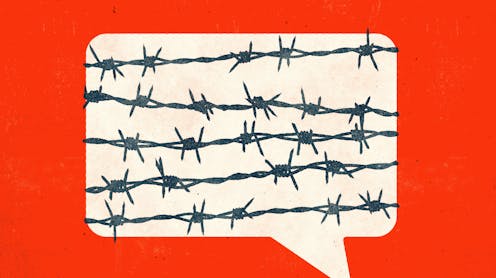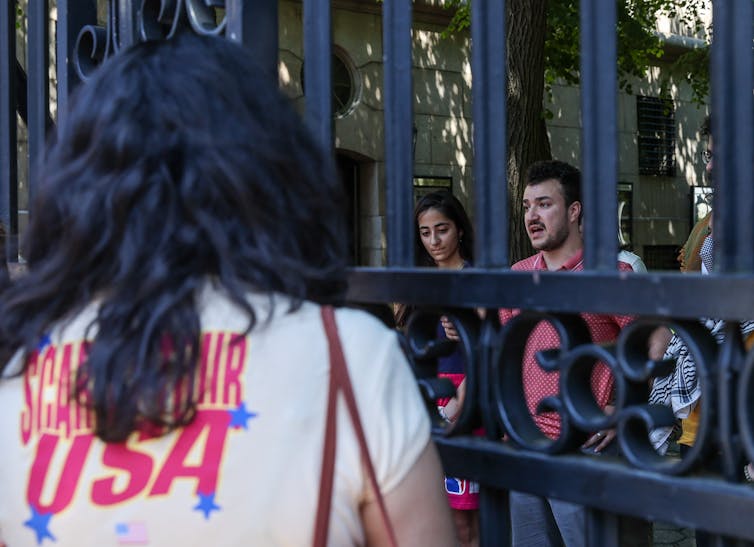Lawful permanent residents like Mahmoud Khalil have a right to freedom of speech – but does that protect them from deportation?
- More than 1,000 foreign university students have had their visas revoked since January 2025, including those who participated in Palestinian rights protests.
- The Trump administration has argued that it can detain and deport noncitizens who participate in Palestinian rights protests under broad language in the 1952 Immigration and Nationality Act, citing potential “serious adverse foreign policy consequences” for the US.
- Lawful permanent residents like Mahmoud Khalil have a right to freedom of speech, but the Trump administration claims that their political speech can be a threat to national security interests, raising questions about the limits of free speech for noncitizens in the US.
- A federal judge has ordered the government not to deport Khalil until all his court cases are resolved, while an immigration judge in Louisiana ruled that he could be deported for being a national security risk, which Khalil’s attorneys are appealing.
- The Supreme Court will ultimately have to determine whether the federal government can deport noncitizens based on their political speech, and if so, what the limits of free speech should be for citizens and noncitizens alike.

The Trump administration has revoked the visas of more than 1,000 foreign university students since January 2025. Many of the individual cases that have made headlines center on foreign-born university students who participated in Palestinian rights protests.
In early March, the federal government arrested, detained and began deportation proceedings against Mahmoud Khalil, a lawful permanent resident born in Syria to Palestinian parents. Khalil participated in Palestinian rights protests at Columbia University in 2024.
U.S. Secretary of State Marco Rubio wrote in an April 9 memo that allowing Khalil to stay in the country would create a “hostile environment for Jewish students in the United States.”
“The foreign policy of the United States champions core American interests and American citizens and condoning anti-Semitic conduct and disruptive protests in the United States would severely undermine that significant foreign policy objective,” Rubio wrote.
Khalil is not the only noncitizen university student with legal permission to be in the U.S. who has been arrested and faces deportation after being involved in the Palestinian rights movement.
Rümeysa Öztürk, a Turkish-born student at Tufts University, was detained by immigration authorities on March 25 near her Massachusetts home and is currently being held in Louisiana. She co-authored a 2024 op-ed in the campus newspaper calling for Tufts to recognize a genocide in the Gaza Strip.
And Mohsen Mahdawi, a Palestinian man who is a lawful permanent resident and a Columbia University student active in the Palestinian rights protests, was detained and arrested on April 25. This happened when Mahdawi showed up at an Immigration and Customs Enforcement office for a citizenship interview in Vermont.
“If you apply for a student visa to come to the United States and you say you’re coming not just to study, but to participate in movements that vandalize universities, harass students, take over buildings, and cause chaos, we’re not giving you that visa,” Rubio said on March 23, when asked by a journalist about revoking student visas and arresting Öztürk.
These cases raise important questions: Do lawful permanent residents have the right to protected free speech? Or are there limitations – among them, a determination by the U.S. government that permanent residents’ speech or political activity makes them a threat to national security?

Selcuk Acar/Anadolu via Getty Images
Noncitizens’ First Amendment rights
Arresting and detaining nonviolent, foreign protesters and the authors of opinion pieces is usually not legally permissible. That’s because these actions are protected by the Constitution’s First Amendment, which guarantees everyone the right to freedom of expression.
The Supreme Court has found that there are some limits to free speech. The government may restrict speech, for example, when someone yells “Fire!” in a crowded theater when there is no actual danger.
The Supreme Court has repeatedly ruled that the right to freedom of speech applies to everyone in the U.S., including noncitizens.
Still, the First Amendment does not apply to noncitizens physically outside the U.S. The Supreme Court, for example, ruled in 1972 that the government may deny visas and bar entry to noncitizens who were seeking admission to the U.S. to engage in constitutionally protected speech.
When noncitizens are living in the U.S., they have the same First Amendment protections as U.S. citizens, the Supreme Court ruled in 1945.
As a scholar of U.S immigration and administrative law, I know that these protections enter a murkier territory when U.S. immigration law collides with the Constitution.
A conflict with immigration law
The Trump administration rests its argument that it can legally detain and deport noncitizens who have participated in Palestinian rights protests – but have not been charged with any crimes – on broad language in the 1952 Immigration and Nationality Act.
This law articulates important immigration rules, like who can enter the country and how someone can become a citizen. It also includes vague language that gives the secretary of state power to deport noncitizens in certain cases.
“An alien whose presence or activities in the United States the Secretary of State has reasonable ground to believe would have potentially serious adverse foreign policy consequences for the United States is deportable,” the law reads.
As foreign-born students Mahdawi, Öztürk and Khalil fight in court for their right to legally stay in the U.S., Rubio and other Trump administration leaders claim that this law gives them the power to determine whether Khalil and other noncitizens are creating “serious adverse foreign policy consequences” for the U.S.
The Department of Homeland Security also wrote on the social platform X on March 9 that “Khalil led activities aligned to Hamas, a designated terrorist organization.”
But the Trump administration has not provided any further specific details about how the views and actions of Khalil and other detained foreign students create serious adverse foreign policy consequences for the U.S. Nor has the government alleged that Khalil and other noncitizen students committed crimes or broke the law.
Khalil’s attorneys have challenged the government’s use of the Immigration and Nationality Act as a basis to deport him in federal court. The lawyers assert that the U.S. government is attempting to deport Khalil for protected speech.
Legal precedent and steps forward
The Supreme Court has ruled that the First Amendment does not protect lawful permanent residents from being deported if their political affiliation violates the laws.
But the court has not yet decided if lawful permanent residents participating in protests or expressing political views are protected against deportation, when the only evident ground for their deportation is political speech.
A federal judge in New Jersey, where Khalil was first briefly detained, has ordered the government not to deport him until all his different court cases are resolved.
On April 11, a different immigration judge in Louisiana – where Khalil is currently detained – ruled that he could be deported for being a national security risk. Khalil’s attorneys are appealing this decision to the Board of Immigration Appeals, which is part of the Department of Justice.
Regardless of the outcome at the district court level, Khalil’s case will be appealed and most likely end up before the Supreme Court.
The Supreme Court will then have to determine the appropriate balance between the executive branch’s authority to deport noncitizens it classifies as posing a threat to the country, and the right to freedom of expression that all people residing in the U.S. have.
If the Supreme Court holds that the federal government can say that someone’s political speech can be a threat to U.S. national security interests, I believe the core of the First Amendment is at risk, for citizens as well as noncitizens.
![]()
Erin Corcoran does not work for, consult, own shares in or receive funding from any company or organization that would benefit from this article, and has disclosed no relevant affiliations beyond their academic appointment.
